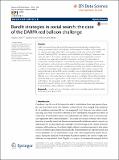Bandit strategies in social search: the case of the DARPA red balloon challenge
Author(s)
Chen, Haohui; Rahwan, Iyad; Cebrian, Manuel
DownloadPublished version (3.944Mb)
Terms of use
Metadata
Show full item recordAbstract
© 2016, Chen et al. Collective search for people and information has tremendously benefited from emerging communication technologies that leverage the wisdom of the crowds, and has been increasingly influential in solving time-critical tasks such as the DARPA Network Challenge (DNC, also known as the Red Balloon Challenge). However, while collective search often invests significant resources in encouraging the crowd to contribute new information, the effort invested in verifying this information is comparable, yet often neglected in crowdsourcing models. This paper studies how the exploration-verification trade-off displayed by the teams modulated their success in the DNC, as teams had limited human resources that they had to divide between recruitment (exploration) and verification (exploitation). Our analysis suggests that team performance in the DNC can be modelled as a modified multi-armed bandit (MAB) problem, where information arrives to the team originating from sources of different levels of veracity that need to be assessed in real time. We use these insights to build a data-driven agent-based model, based on the DNC’s data, to simulate team performance. The simulation results match the observed teams’ behavior and demonstrate how to achieve the best balance between exploration and exploitation for general time-critical collective search tasks.
Date issued
2016Department
Massachusetts Institute of Technology. Media LaboratoryJournal
EPJ Data Science
Publisher
Springer Nature America, Inc
Citation
Chen, Haohui, Iyad Rahwan, and Manuel Cebrian. "Bandit Strategies in Social Search: The Case of the Darpa Red Balloon Challenge." EPJ Data Science 5 1 (2016).
Version: Final published version